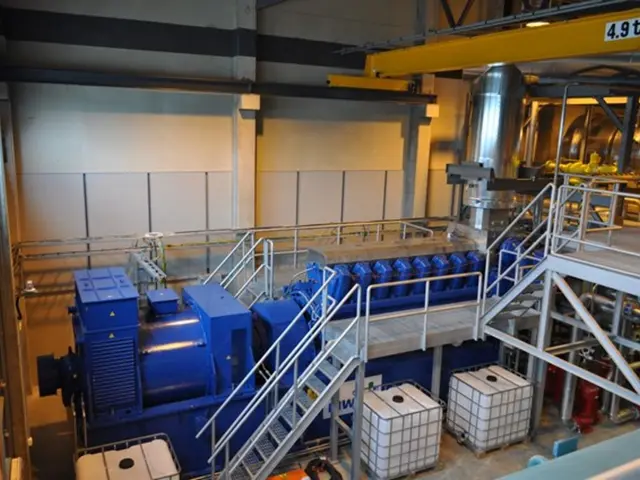Kransnoyarsk's Gasification: China Steps In to Streamline Transport Infrastructure
Face the Chilly Winter Without Gas No More!
Half a year ago, Russia's president mandated the gazification of Krasnoyarsk for its 400th anniversary. The plan was to furnish the city with blue fuel via the yet-to-be-constructed gas pipeline "Sila Sibiri - 2." However, despite Gazprom's eagerness and China's involvement, an agreement on the project's details remains elusive, and the construction's commencement date remains undecided.
Nevertheless, the local authorities are bullish about Krasnoyarsk's gas-free future – an alternative plan for autonomous gazification is already in motion.
A 400th Birthday Gift Worthy of Kings
Although discussions about gazifying Krasnoyarsk had been ongoing for some time, tangible progress didn't surface until summer 2023. In August, a high-level meeting between the president of Russia, regional officials, and key stakeholders took place in the Kremlin, with the governor highlighting the potential fulfillment of Krasnoyarsk's gas desires as the "best birthday present" for the city's 400th birthday.
In October, the president himself formally sanctioned the gazification of the regional center by 2028.
Building a pipeline for a single region's gas needs, particularly a region with a thriving coal industry, is economically unfeasible owing to the small internal consumption volumes. Consequently, regional authorities are banking on the construction of the powerful export gas pipeline "Sila Sibiri - 2:" the proposed pipeline route passes from the Tomsk region through the center of Krasnoyarsk, proceeds towards Irkutsk, and heads towards Mongolia and northern China.
Essentially, the Yenisei region will merely grab a portion of the gas bound for exports.
Agreement on the terms of the second "Force of Siberia" between China and Gazprom remains the project's stumbling block – the two sides are yet to reach a consensus.
Without China, It's a No-Go
Many hoped to see the signing of the gas pipeline agreement during President Putin's visit to China in May the previous year, but it failed to materialize. The reason for the deadlock lies in China's demand to purchase natural gas at domestic prices within Russia, a demand Gazprom refuses, citing the need for significant financial resources (billions of dollars) for the construction.
While the Russian president guaranteed a mutual interest in expanding energy resource supplies, no specific dates for implementing the gas pipeline project have been set.
Experts are optimistic about the project's success as both "Gazprom" and China need it – "Gazprom" needs a market for gas exports, and China seeks a reliable and cost-effective energy source.
Gazification on Hold?
In the absence of a China agreement, Gazprom has not allocated funds for the construction of the gas pipeline to Krasnoyarsk in its investment plan for 2025. This information was disclosed during the second meeting of the regional parliament's working group – the first meeting took place over a year ago.
However, Gazprom maintains that if an agreement is reached this year, the required funds will be secured.
Until then, the region and Gazprom are working on other aspects of the regional gasification plan, which was signed in October 2024.
Crucial milestones in "the roadmap" include:
- Project Development: Gazprom is currently preparing for the design of the main gas pipeline to bring pipeline gas to Krasnoyarsk from Russia's central gas pipeline system. Technical surveys and outstanding obstacles have already been addressed.
- Consumption Analysis: Currently underway is the preparation of a list of liquefied natural gas consumers and a regional fuel and energy balance for 2035 with consideration of price trends and the principles of competition among fuels. The balanced energy budget (TEB) should be ready by August of this year.
- Regional Gas and Gazification Development Program for 2026-2030: This program will include measures for the autonomous gas supply using liquefied natural gas (LNG). Upon final investment approval for the main gas pipeline, LNG-related projects will be added to the program.
Valery Semenov, the deputy governor, explains, "Our primary objective for gazifying Krasnoyarsk has always been and remains the main gas pipeline, but the rest are backup plans, in case, to be frank, there's a failure."
Transitioning to Gas-Powered Buses
Development of the liquid natural gas motor fuel market in the region is a separate gazification initiative, an agreement for which was signed between the region and Gazprom last autumn.
This year, Krasnoyarsk plans to purchase 200 gas-powered buses. Suppliers are currently being considered – GAZ, KAMAZ, and Minsk Automobile Plant (MAZ) are in the running. This procurement will account for one fifth of the city's public transport bus fleet, with no plans to halt there.
LNG fueling stations are also being constructed in the city: one site has already been designated for a gas station in the Krasnoyarsk ATP. Gazprom assures the development of LNG filling infrastructure and stable supplies of LNG for the GAZ stations.
Valery Semenov emphasizes, "The primary option for Krasnoyarsk's gasification has always been and remains the main gas pipeline, but the rest are contingency plans, to put it frankly, in case the pipeline doesn't materialize." Despite his confident tone, precise timelines remain unspecified.
Picture: Gazprom and the Ministry of Ecology of Krasnoyarsk
Enrichment Data:
Overall:
Current Status of the "Сила Сибири - 2" Gas Pipeline Project:
The "Сила Сибири - 2" gas pipeline project is a cornerstone of Russia's gas export strategy to China and is critical for the country's regional development, especially in Siberia. The pipeline aims to increase gas exports from Russia to China by 50 billion cubic meters per year, potentially starting operations in 2030 and reaching full capacity by 2035[2]. However, the project's implementation faces several challenges, including:
- Negotiation Challenges: The negotiations between the Russian and Chinese governments, as well as Gazprom and Chinese energy companies, are complex and time-consuming. The two sides are at odds over multiple issues, including regulatory and political implications, project financing, route selection, and pricing[1][4].
- Urgency: The urgency to negotiate and reach an agreement is tied to geopolitical and security considerations, namely increasing competition in the global natural gas market and tensions between Russia and the West[3].
- Financial Considerations: Gazprom, the primary Russian player in the project, has voiced concerns over the long-term financial viability of the project, given the high costs associated with building and maintaining the pipeline. Additionally, the Chinese government has withheld financial support for the project[3].
- Environmental Concerns: The pipeline's route through the fragile and environmentally sensitive Arctic regions raises environmental concerns. The Russian and Chinese governments have agreed to undertake environmental impact assessments and maritime studies to ensure the pipeline's construction is in line with international standards[1].
- Geopolitical Tensions: The project's success is closely tied to the broader geopolitical relationship between Russia and China and the political stability in the region. Tensions between Russia and the West, as well as ongoing disagreements with neighboring countries, pose challenges to the project's implementation[4].
In summary, while the "Сила Сибири - 2" gas pipeline project holds significant potential for bolstering the economic and energy security relationship between Russia and China, its implementation is hampered by various challenges, including complex negotiations, financial constraints, environmental considerations, and geopolitical factors. The future of the project remains uncertain, and further cooperation and agreement between the Russian and Chinese governments, as well as Gazprom and Chinese energy companies, will be essential for its success.
- The local authorities in Krasnoyarsk are optimistic about the gas-free future of the city, as they have already initiated an alternative plan for autonomous gazification, in case the construction of the "Sila Sibiri - 2" gas pipeline remains undecided.
- While negotiations between China and Gazprom regarding the "Sila Sibiri - 2" gas pipeline project are ongoing, the project's specific implementation dates have not been set, leading Gazprom to withhold funds for the construction of the pipeline to Krasnoyarsk in its current investment plan.








